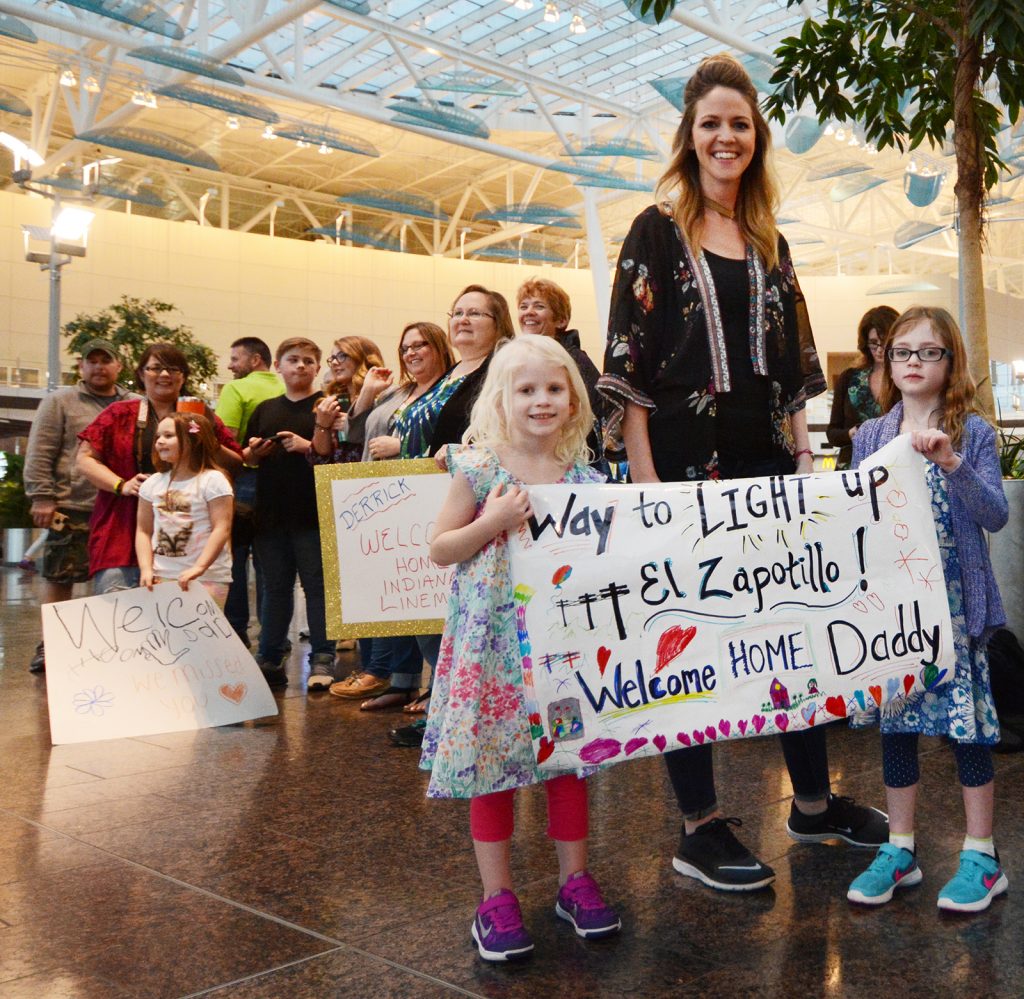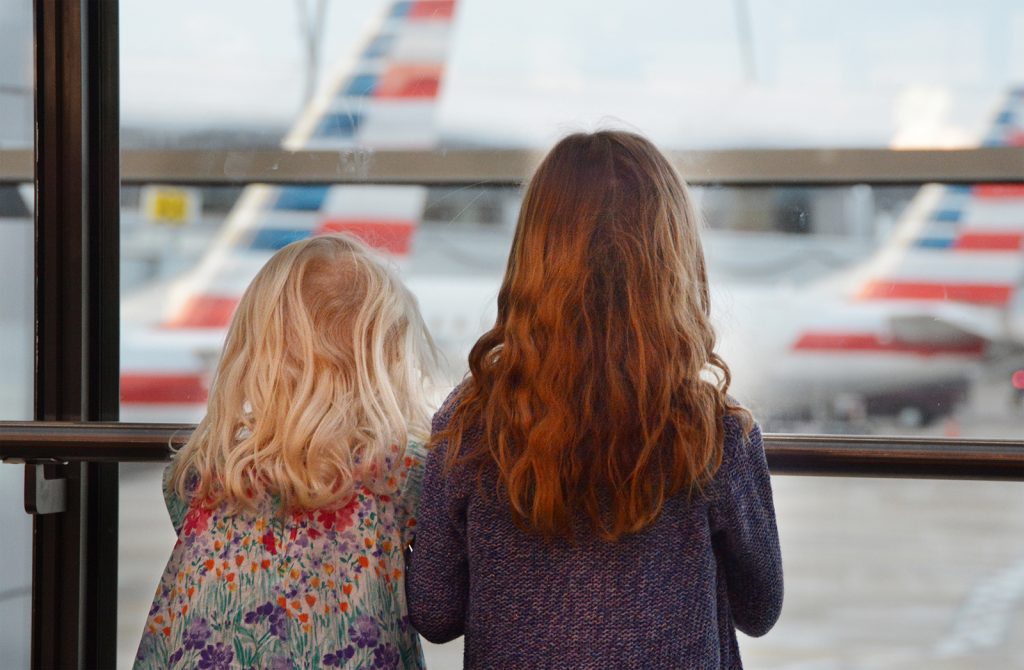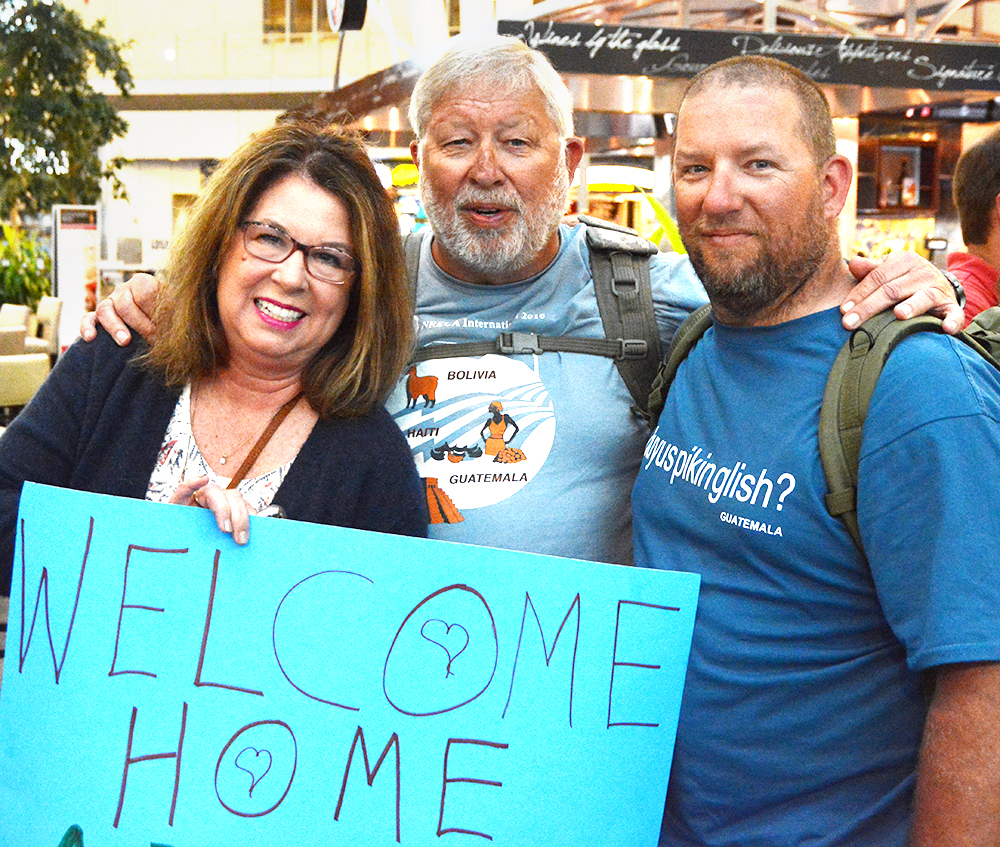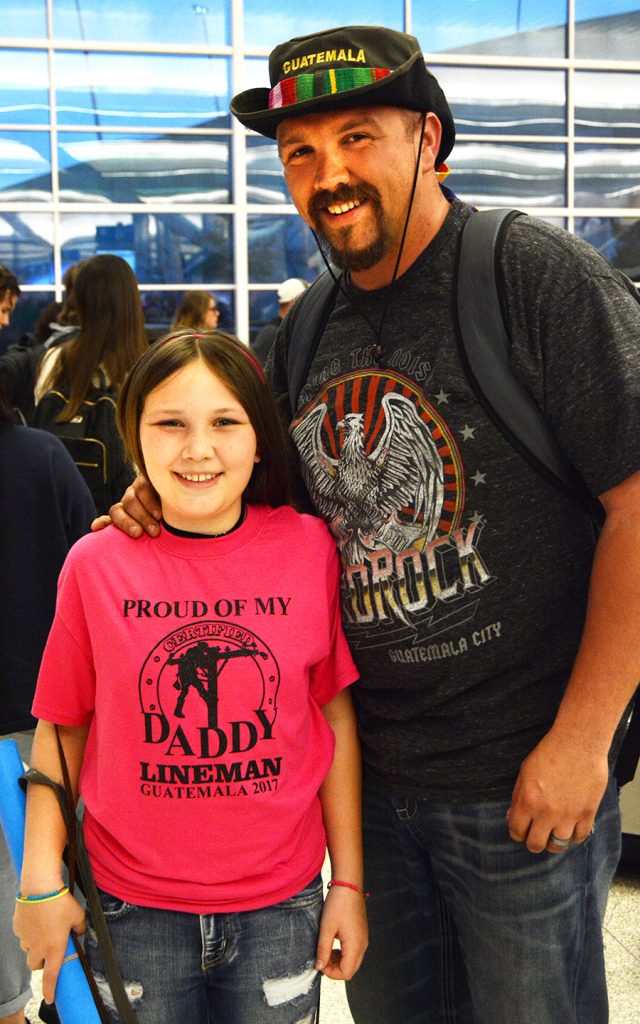Simple Gifts: One Project Indiana lineman’s family shares in his sacrifice of time and the joy in his coming home
Isaac Harp missed his youngest daughter’s fifth birthday. He didn’t even call.

But it wasn’t because the Kosciusko REMC journeyman lineman forgot her birthday or was too busy to be bothered. Quite the contrary: he was another world away — in remote Guatemala on the third Project Indiana building trip in March 2017. Like the others on the trip, he literally had to climb to a nearby mountaintop to find a signal to make any brief call home. He made contact the next day with Katie, the birthday girl; his older daughter, Haley; and wife, Kelly.
Electric cooperative linemen and their families know about sacrifice. It comes with the territory: they work dark desolate stretches of rural roads during a Christmas Eve snowstorm, for instance, to restore power so others can enjoy the warm glow of holiday gatherings. But Project Indiana volunteers, working 1,800 miles from home on a Guatemalan mountainside for weeks, have faced new kinds of sacrifices to bring what Americans would consider the “simple gift” of electricity to the homes and subsistent farms of people who have never had it before. They miss birthdays and being away for two or three weeks from their wives and kids. While away, Isaac also missed out on a bout of illness that affected the whole family, including their two dogs.
The 2017 trip of “Project Indiana: Empowering Global Communities for a Better Tomorrow” was the third of the four the non-profit cooperative initiative has made to Guatemala. Isaac joined a crew of 15 other Indiana electric cooperative lineworkers and three supervisors, supported by the National Rural Electric Cooperative Association’s international program, to electrify the village of El Zapotillo near Guatemala’s southwestern border with Mexico.
Working sometimes as high as 10,000 feet in the mountains, the team electrified 60 homes, a school, a church and a clinic with 31 miles of power line — all built by hand and without the aid of modern conveniences such as bucket trucks.
Project Indiana began in August 2012 when 28 Hoosier lineworkers spent four weeks working in the same mountainous area. In April 2015 and again in early spring of 2019, crews of 14 lineworkers battled heat and rugged terrain in the eastern part of the country. Another trip is being planned for late 2021.
Before he left, Isaac and Kelly were open with their two daughters about the “mission trip” on which he was about to embark. They celebrated Katie’s birthday early and talked about where he was going and what he would be doing.
“They understood since they’ve always seen Isaac do line work,” said Kelly. She noted they’ve seen him leave during storms in the middle of the night, and they’ve helped her take water and food to him and coworkers during extended storm-related repairs along the roadsides. “They have a good understanding of that.”

She said the girls, now 10 and 8, also understood when they explained about their dad going to an area that was remote and didn’t have electricity. “He would get the opportunity to give that to people. They understand what it’s like to have their power out.”
But to help give the girls the bigger picture, they showed them maps of where he’d be going and the terrain, and they watched the PBS documentary from the first Guatemala trip Hoosiers took in 2012 that was recorded and documented by free-lance journalist Diane Willis and a camera crew from WFYI in Indianapolis. The girls gained an understanding of the third-world environment their dad was about to venture into and the poverty he would see.
In addition, Isaac and Kelly wanted their kids to share in the upcoming experience in a personal way.
“You guys are just as much a part of this as Dad,” Kelly told Haley and Katie. “Dad’s going to be the one going, but we’re all sacrificing something so we can give to others. Part of our sacrifice is being home without him, but what are ways that we can think of giving to the people, in addition to what he’s going to be giving?”
She said Haley, then 8, immediately thought of a gift bag. Knowing Isaac’s luggage space would be limited, Kelly helped the girls gather items for two tote bags. They filled them with school supplies such as a notebook, personal items such as a toothbrush, an activity booklet, sunglasses, a baby doll or a stuffed animal, and favorite things they figured every girl their age would love: bracelets and hair ties. They also drew pictures for the two girls who would be selected to receive their simple gifts.
Once Isaac arrived in the village, locals put him in touch with two orphaned sisters, Rosita and Naomi, who were just about the same age as his own girls. He presented the totes to them. Haley and Katie wanted their gifts to go to girls their age, just so Dad wouldn’t forget his own two girls missing him back home.
The nearly three weeks away was the longest he and Kelly had been apart since they had been married. Isaac also missed out on the sickness that hit home almost as soon as he left.
Kelly said first both of their dogs got sick. Then, something moved through the family like the flu, first affecting Katie, then Haley. She noted Haley occasionally had flare ups with Gerd — Gastroesophageal reflux disease — that made the illness worse. Kelly did her best to keep Haley hydrated, using strawberry smoothies, but her stomach ailment only got worse.
As Kelly feared Haley might have to be hospitalized, good neighbors in the medical field stepped in to help her keep a close eye on the situation. “I felt God’s hands through the people that really gave to us and knew that would be a tough time having Isaac away,” she said.
The two times Isaac was able to call home while on the mountain, Kelly was vague about Haley’s illness. She said she felt they had everything they would need, and she didn’t want Isaac to worry while he was so far away. They found out later Haley was allergic to strawberries, which added to her illness.

By the time the Project Indiana crew headed home about three weeks after they left, Haley was feeling much better. Kelly and the girls drove down from Kosciusko County that day and stood outside the Indianapolis airport concourse with dozens of other family members and coworkers of the crew to celebrate the return home of the linemen.
Haley and Katie couldn’t contain their enthusiasm. “I just wanted to skip,” Haley recalled. She was giddy, eating Goldfish crackers. When her dad appeared with the other grizzled and tired linemen to the cheers of the crowd, the two girls and Kelly swarmed in on Isaac with hugs and kisses — as the other folks had done with other returning linemen.
Haley and Katie continued their joy at their dad’s return all the way through the luggage return out to the parking lot.
“There’s something about that time apart when you long so badly to be with the person,” recalled Kelly, “and then you’re able to experience all that excitement and to see how excited the girls were. It was pretty special.”
Coming home to the airport reminded Isaac of another time … when he was about the age of his daughters. “My dad went to Panama on a missionary trip. I remember going to the airport and seeing him come out of the gateway. It was kind of the same thing.”
Isaac’s dad was a contractor who used his special skill to help build a church in the Panamanian jungle. Isaac and the rest of his cohorts used their special skillset to bring electricity. “There are few people that know how to build power lines,” Kelly said. “To be able to give in that way is amazing.”
As a former electrician, Isaac used his time in Guatemala wiring the rustic homes that would soon be filled with electric light. He took three local villagers as his crew and taught them simple wiring and troubleshooting skills. Then, like most of the other Hoosiers, he left his tools for the local villagers to carry on.
Isaac’s dad later became a pastor of an independent church in northern Miami County, near Mexico, Indiana, coincidentally. And Isaac, in junior high, traveled with his parents on a church mission trip to Russia in 1998.

In addition, Kelly’s father and grandfathers were pastors of Methodist churches. Kelly also had been on mission trips to rural Kentucky and Ontario, Canada, during her youth group days. So, neither Isaac nor Kelly were strangers to what missions are all about. “But not like power lines up a mountain,” Kelly noted.
Kelly said she hopes when their girls get a little older, the entire family can take a mission trip together to help less fortunate people in Third World countries in any way they can. And she hopes the sense of compassion carried across the miles by her husband, his dad and Isaac’s cooperative coworkers can be passed on to her daughters. In the meantime, she hopes to involve the girls and even their classmates in fundraising for Project Indiana or for a need in the next village they go to.
“I feel linemen have a heart for the work that they do. It’s more than just the trade. They have a heart to be able to give truly a whole other world to people,” she continued. “It’s quite an inconvenience for us not to have power. But it’s more than that … just what it can do for countries that don’t have access to power. Your livelihood looks so different.
“For him to be able to do that — that was a big reason he went to an REMC,” Kelly added. “Part of our desire to be part of an REMC was the opportunity he could have giving back that way. It was a huge pull. Being able to join the two things he’s so passionate about — giving to others in that mission field and then his trade with the power — it was the perfect scenario.”
“We get a lot out of it,” said Isaac. “But obviously what you can give is so much more. It’s a small sacrifice for the big picture of what it can give to others. The awareness of the mission field and evangelism just by putting your feet on the ground and going out and being the hands and feet was something I always wanted to be a part of and support.”
